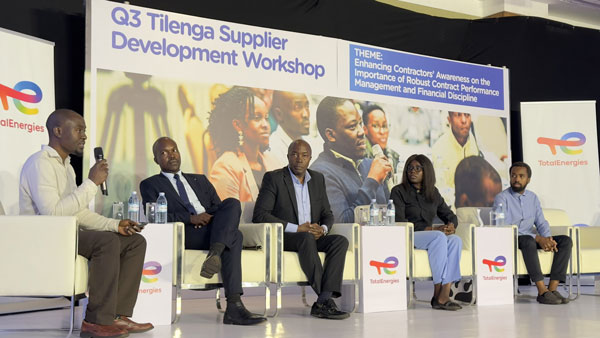
Kampala, Uganda | THE INDEPENDENT | Ugandan companies have secured contracts worth about 642 million dollars (2.4 trillion Shillings) under the Tilenga Project since TotalEnergies EP commenced the commercial oil and gas production phase. The company says these contracts went to subcontractors under the segment referred to as Tier 2, which were ring-fenced for Ugandan companies under the Local Content Policy on oil and gas.
Mariam Nampeera Mboowa, the Deputy General Manager of TotalEnergies EP Uganda said these involved the supply of locally sourced goods and services by mainly the Small and Medium Enterprises (SMEs). The lead investor in the Ugandan oil and gas industry says so far, 150 different local companies have benefited from the Tilenga Project, handling different activities.
Nampeera was speaking at the TotalEnergies Supplier Development Forum in Kampala, with a focus on Contract Performance and Financial Discipline. Giving an account of what the company thinks are the benefits to the country so far, Nampeera said the activities have resulted in more than 8,000 jobs created with more than 44 percent going to host communities. Though a majority of these jobs are low skill, they have managed to transform the lives of many Ugandans, according to her.
Amidst the developments, however, there have been challenges including delayed payment of contractors, and untimely completion of tasks among others. Alex Byamukama, the Senior National Content Officer at the Petroleum Authority of Uganda stressed the importance of contract performance in ensuring smooth relationships between the two contracting parties and smooth implementation of the contract.
“In terms of contract management, it is important to keep your records properly and easily accessible. One of the benefits is having proper project execution and an opportunity to learn from your execution processes,” said Byamukama. He said contract performance and financial discipline are very important as they lead to timely execution because timely completion of the project is the goal of the government.
Byamukama said some of the conflicts over contracts arise from the lack of time by the contractor to scrutinize all the clauses therein. He also urges contractors to learn financial discipline and management and ensure that the money received especially through borrowing, is utilized for the intended purpose.
The commercial development phase activities commenced after the Final Investment Decision was made by the companies and since then, works have been going on on the central processing facilities, feeder pipelines, well pad preparations, and rig assembling.
Both TotalEnergies and CNOOC, the other joint venture partner operating the Kiñgfisher project, have since commenced drilling. Denis Kakembo, Managing Partner at Cristal Advocates warned contractors in the oil and gas activities against illegal practices like tax evasion. He said the Uganda Revenue Authority “can wipe out your profitability if you are non-compliant.”
The company also celebrated having made 20 million man-hours without time-lost incidents, a feat reached on August 10. This was achieved 226 days after the 10 million man-hour mark that was realized earlier in January 2023. Of those hours, 94 percent were executed by the contractors. Martin Fraser, TotalEnergies Manager Project Control and Compliance, said this shows how much skill the workforce both at TotalEnergies and the contractors have achieved.
A lost time incident (LTI) is an injury sustained on the job by an employee that results in the loss of productive work time for more than 24 hours, permanent disability, or even death.
****
URN
 The Independent Uganda: You get the Truth we Pay the Price
The Independent Uganda: You get the Truth we Pay the Price





